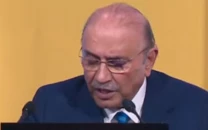NAB convicts entitled to remission
The court declared Article 10-D of the NAB Ordinance ultra vires of the constitution and struck it down.

NAB convicts entitled to remission
The apex court announced this verdict in a case pertaining to remission of sentences of National Accountability Court (NAB) convicts on which the seven-member SC bench headed by Chief Justice Iftikhar Muhammad Chaudhry had reserved judgment last year after detailed hearing.
The court declared Article 10-D of the NAB Ordinance ultra vires of the constitution and struck it down following which the convicts in NAB cases will equally be entitled to receive reduction or amnesty in their sentences under Article 45 of the Constitution.
Article 45 of the constitution states “The President shall have power to grant pardon, reprieve and respite, and to remit, suspend or commute any sentence passed by any court, tribunal or other authority” but before the announcement of the verdict of Supreme Court in this case NAB convicts were not entitled to be given this relief under the said article by the President.
The judgment written by Justice Tassaduq Jillani stated that the court framed issues in this case that “Whether under Article 45 of the Constitution of Islamic Republic of Pakistan, the President enjoys unfettered powers to grant remissions in respect of offences and no clog stipulated in a piece of subordinate legislation can abridge this power of the President as held by this Court in Abdul Malik & others v. The State & others (PLD 2006 Supreme Court 365)”
Secondly, “whether the policy formulated by the Government of Pakistan, Ministry of Interior, dated August, 2009 is in consonance with the judgment delivered by larger bench of this Court in case Shah Hussain v. The State (PLD 2009 Supreme Court 460)”.
Thirdly, “whether the Prison Rules as enumerated are subservient to Article 45 and in case of any conflict between Prison Rules and above-referred judgments as well as special remissions under Article 45 of the Constitution and what would be the legal position of the said Rules”.
Fourthly, “whether any classification would be permissible in view of the nature of accusation in case special remission is granted by the President of Pakistan, in view of the provisions as enumerated in Article 25 of the Constitution”.
The court found that In Saleem Raza Vs. The State (PLD 2007 Karachi 139), convict under the NAB Ordinance had challenged, inter alia, the vires of Section 10(d) of the NAB Ordinance which mandated that convict under the NAB Ordinance “shall not be entitled to any remission in his sentences”.
The precise contention was that the said provision was discriminatory and violative of Article 25 of the Constitution. A full bench of the Sindh High Court relying on precedent case law of this court came to the conclusion that class legislation was forbidden; that permissible classification is allowed provided it is founded on an intelligible differentia which distinguishes persons or things that are grouped together from others who are left out of the group.
Any law made or action taken in violation of these principles was liable to be struck down. Keeping this principle in mind, the court held that a comparative examination of provisions contained in NAB Ordinance and Prevention of Corruption Act, 1947, indicated that those provisions were substantially the same and there was no difference in the offences of criminal misconduct contained in Section 5 of the Prevention of Corruption Act, 1947, and corrupt practices defined in Section 9 of the NAB Ordinance.
Notwithstanding this similarity in substantive law, if an accused is convicted by a Court other than Accountability Court, the convict is entitled to earn remissions while the NAB convict for the commission of the same offences under similar set of circumstances was deprived of the remission on account of section 10(d) of the NAB Ordinance. The court, therefore, found this provision to be ultra vires of the equality clause of the constitution.
Published in The Express Tribune August 12th, 2010.



















COMMENTS
Comments are moderated and generally will be posted if they are on-topic and not abusive.
For more information, please see our Comments FAQ